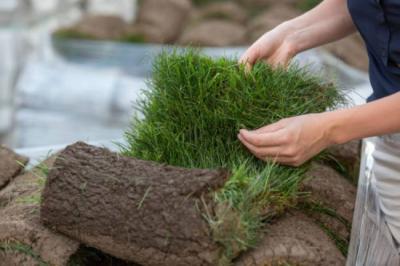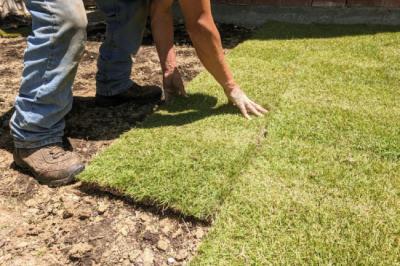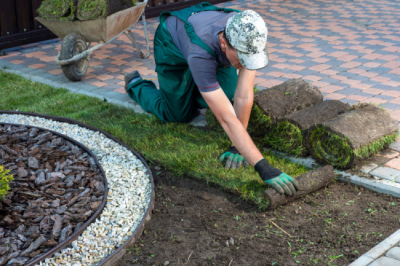succeed. A sunny site, neat soil preparation, and proper seed sowing and cultivation are all necessary. This guide elaborates on the significant procedures required for your Georgia grass to be the ideal Bermuda grass.
Steps for Planting Bermuda Grass Seed in Georgia?
Selecting the Correct Bermuda Genotype
Before following the steps for a Bermuda grass seed plantation in Georgia, you must choose the Bermuda grass variety that suits your specific environment well. Bermuda grass (Cynodon dactylon) and Tifway 419 or TifTuf are the common turfgrass adapted to the Georgian climate. Every variety has characteristics like drought resistance, disease tolerance, and texture. Consider factors like pedestrian traffic, shade exposure, and spot cleaning for easier picking.
Is the Climate Okay for Growing Bermuda Grasses?
Climate has to be the determinant when growing Bermuda grass for success. The good news is that the hot summers and relatively mild winters allow Bermuda grass to grip the soil and create an ideal growing environment. You should contact grass seed suppliers to learn more about the perfect climate and weather conditions to plant the grass.
Preparing the Soil
The soil preparation process should precede the following three steps.
Clean Up the Soil: Clean up the area by digging out weeds and rocks using a rake. This Georgia Bermuda grass planting step provides a good rooting ground for your Bermuda grass to germinate and grow.
Soil Testing: A key element in soil preparation is conducting a soil test. Assessing the pH levels and nutrient content will help us decide what amendments to apply to achieve the maximum Bermuda grass growth. In Georgia, Bermuda grass is better grown in slightly acidic to neutral soils whose pH ranges from 6.0 to 7.0.
Soil Amendments: Based on the soil test results, amend the soil as necessary. This may involve adding fertilizers or lime to achieve the ideal pH levels. By and large, the energetic Bermuda grass prefers soils tended well to get all the needed nutrients. You can consult experts at Atlanta Sod Farms to learn how to make the soil ready for plantation.
Planting Bermuda Grass Seed
After preparing the soil, you should be ready to plant the seeds. The best location to set it up is sunny, where the Bermuda grass flourishes under full sun. The seeds are even distributed across the prepared soil surface, using a seed spreader or broadcasting by hand for uniform coverage.
Timing is Key: Determining the ideal time to plant Bermuda grass in Georgia is crucial. The suitable weather is from late spring to early summer when soil temperature is at least 65°F (18°C). This timing aligns with Bermuda grass's natural growth cycle, fostering successful germination and establishment.
Seed Distribution: Carefully distribute the Bermuda grass seeds across the prepared soil. Even spacing ensures uniform coverage, preventing overcrowding and promoting healthy growth. This meticulous approach maximizes the chances of each seed developing into a thriving grass plant.
Light Raking: After seed distribution, lightly rake the soil to cover the seeds. Avoid burying them too deep, as this could impede germination. The goal is to have the seeds directly contact the soil while maintaining access to sunlight for optimal growth.
Watering and Maintenance
These are the steps for adequately maintaining Bermuda grass.
Initial Watering: Once the seeds are in place, initiate the watering process. Provide a light but thorough watering to kickstart the germination process. Consistency is essential during this initial phase to keep the soil consistently moist. This is an important step in the Bermuda grass seeding guide.
Establishment Period: During this period, the moistening condition of Bermuda grass seeds should be maintained. However, do not overwater, as this may create wet conditions that do not benefit germination but harm them.
Mowing Practices: Once your Bermuda grass has settled in, observe unusual-sense mowing practices. Mow the garden while the grass is at least 2 inches tall. This stimulates wholesome root growth and, hence, the overall resilience of your Bermuda grass garden.
Conclusion
Learning how to plant Bermuda grass seed in Georgia is a tremendous undertaking to produce a massive grass-blanketed subject. Ultimately, by selecting relevant cultivars like Atlanta Sod Farms, proper soil coaching, and suitable planting and protection, your desired qualities of Bermuda grass may be achieved in your outdoor space.
Frequently Asked Questions
How do you germinate Bermuda grass seed?
The sunny ground with appropriate drainage soil is the exceptional desire to plant Bermuda grass seed in Georgia. Remove any debris and do a soil check before adjusting the soil. Distribute seeds evenly, gently cowl with soil, and maintain moistness. After putting it in, please regularly water and fertilize deep and green grass.
What month do you plant grass seed in Georgia?
The best time to plant grass seed in Georgia is spring or early summer, from April to June. The soil temperature stays over 65°F for long months, becoming a communication channel for seed germination and providing a healthy and safe farmland.
How long does it take for Bermuda seed to sprout?
Bermuda grass seed germinates 7-21 days after exposure to the required temperature and moisture in the most favorable soil surface. However, soil preparation, seed quality, and environmental conditions can influence the germination time.





